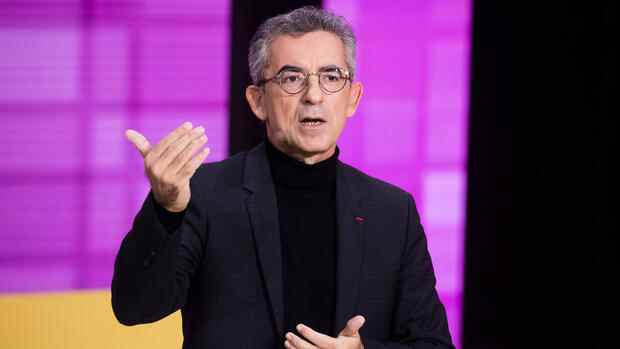The 59-year-old has been at the helm of the company for almost ten years.
(Photo: imago images/IP3press)
Frankfurt The largest European payment processor, Worldline from France, is targeting further acquisitions. Worldline boss Gilles Grapinet told Handelsblatt: “I will exercise the mandate that I have been given by the supervisory board, and that includes examining possible takeovers. The payments industry is all about the technology at scale.” Industry-wide consolidation will continue, Grapinet said. The European payment market is still fragmented.
Worldline has bought several competitors and specialists in recent years. These include Six Payments from Switzerland and Ingenico from France. Worldline holds the majority in Payone from Frankfurt – German savings banks also hold shares in the company.
Nevertheless, Grapinet sees “enough space for several large payment companies in Europe” – and growth opportunities for the industry: “The volume of cash payments is still very high, around 50 percent in Europe, and e-commerce will continue to grow,” said Worldline -Boss.
The 59-year-old has been at the helm of the company for almost ten years. Worldline calls itself the largest payment processor in Europe and the fourth largest payment service provider in the world. The group has around 18,000 employees.
Top jobs of the day
Find the best jobs now and
be notified by email.
Payment companies process payments at the cash register and increasingly in e-commerce on behalf of retailers. Payment service providers offer all necessary payment methods for online trading, such as credit cards, PayPal or purchase on account, from a single source. Providers like Worldline receive a small part of the transaction volume from retailers as a fee.
Business is booming – with low margins
The business is booming due to the worldwide trend towards more digital payments. But in view of the low margins, the competitive pressure is enormous. For providers, the aim is to process as many payments as possible via their systems and thus reduce the costs per transaction.
More and more people pay with bank cards. Payment processors like Worldline are benefiting from this – as well as from the growth in e-commerce.
(Photo: obs)
With Adyen from the Netherlands, Checkout.com from Great Britain and Stripe from the USA some relatively young companies have become big competitors. Unlike many of its competitors, Worldline also processes payments on behalf of banks that have outsourced parts of their payment transactions.
In terms of stock market value, Adyen is ahead at around 44 billion euros, but the share has lost significantly over a twelve-month period. Worldline comes to around twelve billion euros, the Nexi Group from Italy to almost eleven billion euros.
At Worldline, the acquisitions have been of great importance in recent years. Two-thirds of the growth over the past five years came from acquisitions, and one-third was organic, according to the company. In the third quarter of 2022, sales rose to almost 1.2 billion euros, which corresponds to organic growth of ten percent.
In Germany, Worldline is particularly represented by Payone. And that’s how it should stay: “We’ll keep ‘Payone’ as the company name. It’s an established brand,” Grapinet said. There is absolutely no reason to change such a brand name. The company processes payments for Aldi Süd, Deutsche Bahn, Notebooksbilliger.de, Puma, Rossman and Zalando, among others.
More scrutiny by supervisors
With a view to an intensive investigation of the industry by the German financial supervisory authority, Grapinet said: “We fully welcome this examination and the dialogue with the supervisors.” It is very important to understand that the payments business is all about trust. “It only works if customers trust the system as a whole and the payment service providers. A big part of the trust comes from the fact that we are licensed and regularly audited.”
Almost a year ago it became known that the financial regulator Bafin had started to scrutinize several large payment service providers after the Wirecard scandal. In addition to a special audit at Unzer, the authority also started intensive investigations at Payone and Concardis – including whether the precautions against money laundering and other illegal transactions were sufficient, several people familiar with the topic told the Handelsblatt at the time.
The background was the bankruptcy of Wirecard. The special audit for German payment service providers ordered by Bafin in the wake of the Wirecard incident has now been completed for Payone, Worldline said.
>> Read here: “Serious deficiencies”: Bafin takes action against payment service provider Unzer
The supervisors found significant deficiencies at Unzer. The subsidiary Unzer E-Com GmbH is not allowed to take on any new customers until further notice, as Bafin announced at the end of August. In addition, the authority sends a special representative to the entrepreneur to monitor that Unzer eliminates his weaknesses.
According to Bafin, the special audit revealed “a large number of deficiencies, some of which were serious, in the areas of appropriate corporate management measures, control mechanisms and processes”. In addition, “serious deficiencies” in the fight against money laundering were identified.
More: New payment cards on the market: Two US corporations are challenging the Girocard
